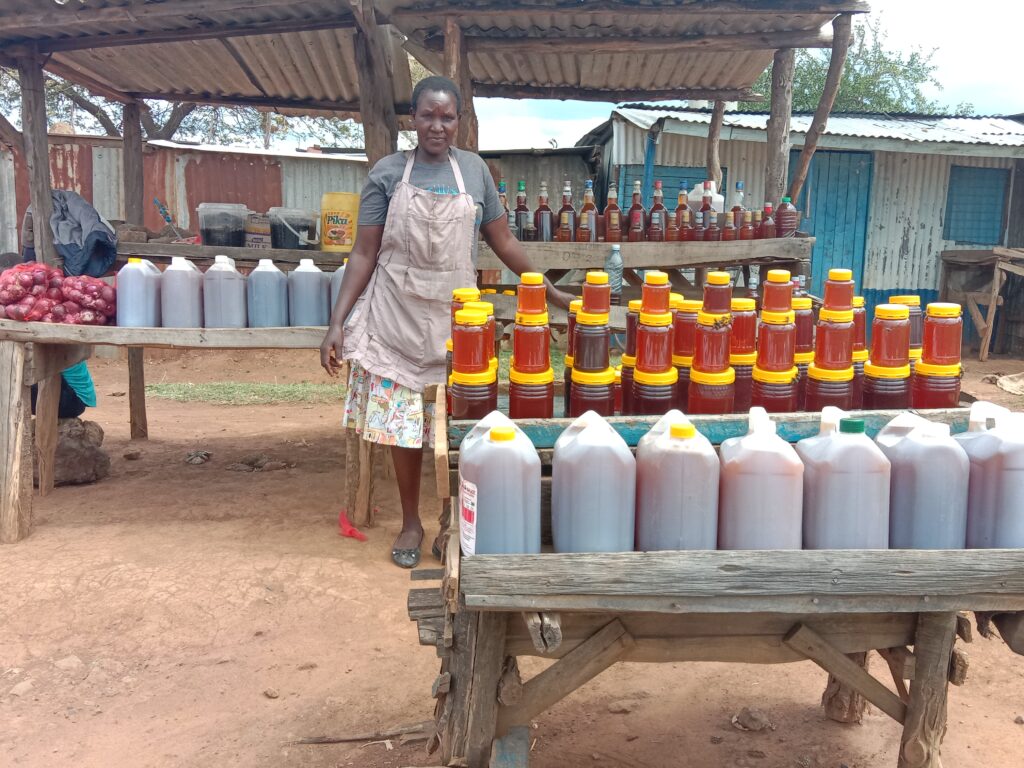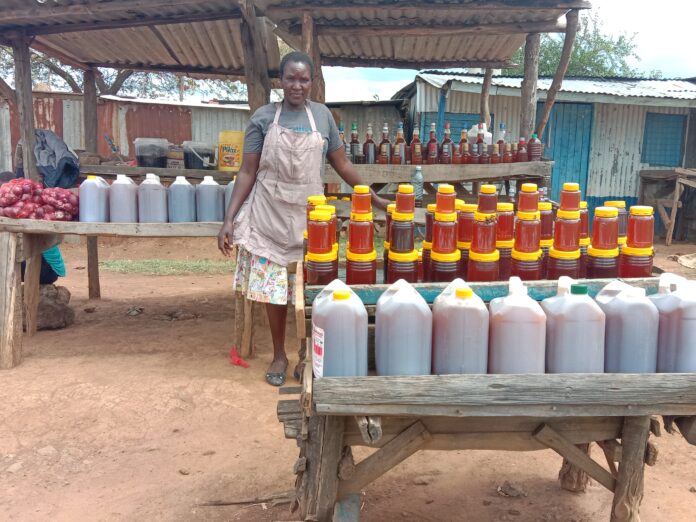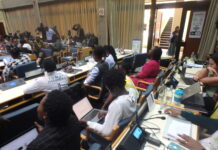By Wesley Langat
Kipsyenan-Mogotio: When the first Covid-19 case was reported in Kenya, Gladys Chepkorir a mother of three and a small-scale trader who sells honey at Kipsyenan in Mogotio Baringo County didn’t anticipate any change in her business environment. A few weeks later, the government imposed a lockdown to curb the spread of the pandemic forcing her to close her shop.
“This came as a shock to me, no one was there to buy my stocks. All the businesses around here closed down and the place got deserted; no customers” She explained.
In this spot, the majority of businesses are dominated by consumer-led goods such as groceries and honey. However, these kinds of small-scale trading are particularly owned by women and are established along the road under a very fragile business environment. As a result, they are vulnerable to losses and as such, they were the most affected by the pandemic.
Previously, Gladys was running a retail food shop business but in 2012 the building that housed her business was demolished to pave the way for road construction. At that time, she didn’t have any fallback plan, not even farming or livestock at home, business was her only source of income.
“My shop business was doing very well, it was established in a good location and I didn’t imagine going back to zero.” She regretted, “After the building was brought down, I went back to starting another business of buying raw honey from beekeepers, refined, packaged it in bottles, and sold it on the roadside” She paused.
According to a UN Women Kenya study, Covid-19 disrupted sources of livelihoods and in the process, women lost their livelihoods 1.6 times higher than their male counterparts. The pandemic made it difficult for Gladys’ business to stay afloat in the wake of the Covid-19 wave.

“I remember that week, I had restocked my business, with nowhere to sell, and kept it in the house” She remembered.
The analysis from the UN Women on Unpaid care and domestic work during Covid-19 shows that both women and men are bearing the increased burden, 60 percent of women and 54 percent of men reported that they have increased the amount of time they spend on unpaid domestic work since the pandemic began.
In addition to the losses from the collapse of the honey business which was a critical source of livelihood for supplementing her family’s income, she also took care of her aging parents, a responsibility that according to her is time-consuming. When she lost her honey business, Chepkorir went back home and concentrated on looking after her parents.
“Life was getting tougher. I look after my parents at home and I have to pay school fees for my children. My income was diminishing,” She added.
Honey Business cushion women against Covid-19 Shocks.
According to the traditions of the Tugen community, a sub-tribe of the Kalenjin people living in the Rift valley, handling, harvesting, and selling honey was a male-dominated affair. But Joseph Kipngok, who is in his early 70s and has been in the honey business for fifty years, says that the trend has changed and now the majority of honey sellers are women.
“Nowadays women are the majority in the honey business, the belief has changed, everyone has a right to fend for her/himself in whatever way”
Mary Kobilo, a 60 years old woman who also engages in the honey business says that women started selling honey because of its medicinal content. “Honey is good for treating diseases that affect young children and that is how women entered into the business” Mary commented. She added that since she started selling honey 30 years ago it wasn’t her full-time job but now she does it as a business.
When Chekorir shifted her stock back home, little did she know that it was the beginning of a booming honey business? In her village, she started hearing her villagers recommending honey as a preventives measure for covid-19 and this was reaffirmed when many people started calling her looking for honey. An opportunity that marked the beginning of her booming sales.
She narrated how her business picked up. “I began getting calls from my customers as far as Nairobi ordering the honey and because I had it in plenty and I was able to supply them.”
Against the backdrop of a diminishing business environment due to covid-19 pandemic, her honey business was gaining momentum due to the growing demand for honey. During that period Chepkorir could sell up to Ksh.30,000 (300USD) a week, an amount which she has never sold before.
At the time of the Covid-19 pandemic, Gladys sold her product remotely via phone and this helped her cut costs as well as having time to take care of her parents and her three children. Unlike other businesses, she never stopped selling honey.
Like many other women in small and medium enterprises, Chepkorir revealed that she has not received any financial support to boost her business. When asked whether she belonged to any women’s group or has ever had to borrow money from any financial institution, she responded that she has been ploughing back the profit into her stock instead of saving in bank or women’s groups. She also fears joining any women’s groups citing high pressure to pay contributions during low sales.
While appreciating her honey business, she has steadily supported her family, paying school fees for her children as well as buying food for her family.
“I’m lucky, my business didn’t collapse during Covid-19, I never stopped selling, and up-to-date my business is doing well.” She concluded.
Implement policies that support women economically.
The Women Empowerment principles,2011 of the UN Women empowers women to participate fully in economic life across all sectors and throughout all levels of economic activity is essential to build strong economies; establish more stable and just societies.
But Faith Alubbe, a human rights lawyer and also the director at Kenya Land Alliance, an organization that advocates for community land rights in Kenya emphasized the need to fully implement women’s economic policies to help them recover fully from Covid-19 shocks.
Faith further mentioned that women suffered a lot of issues during covid-19 and left them in a very difficult economic situation.
“When the markets were closed most women lost their sources of livelihoods, those in small trading businesses lost their business and thus couldn’t make a living” She explained in an interview in her office.
After the pandemic, Alubbe noted that Kenya was going into an election period that couldn’t favour women’s recovery. However, she added that women need more support to be able to come back to their feet economically.
Kenya’s New Constitution of 2010 recognized the full participation and involvement of women in economic development. Therefore, compelling structures of governance to include both genders and offers guiding principles to strategies on Women’s Economic Empowerment from broad-based government initiatives with respect women’s empowerment. Nevertheless, Alubbe pointed out that there has never been a challenge when it comes to women’s economic policies in Kenya but there is a huge gap when it comes to implementation.
“We need more resources because there is still a lot of work to do to change the attitude and enforcement. This is where the gap is,” she said.
The Human rights lawyer gave a scenario where the national and the county governments implement programs for gender-responsive financing that reinforce economic inclusions towards Covid-19 recovery, but she further noted that lack of awareness among women especially in the rural areas challenges the success of these programs.
“There is an urgent need to fully implement reforms to give women equal rights to economic resources, as well as access to ownership and control over land and other forms of property, financial services, inheritance, and natural resources, per the New Constitutions” She concluded.
This publication was produced with the financial support of the European Union. Its contents are the sole responsibility of Wesley Langat and do not necessarily reflect the views of the European Union.














